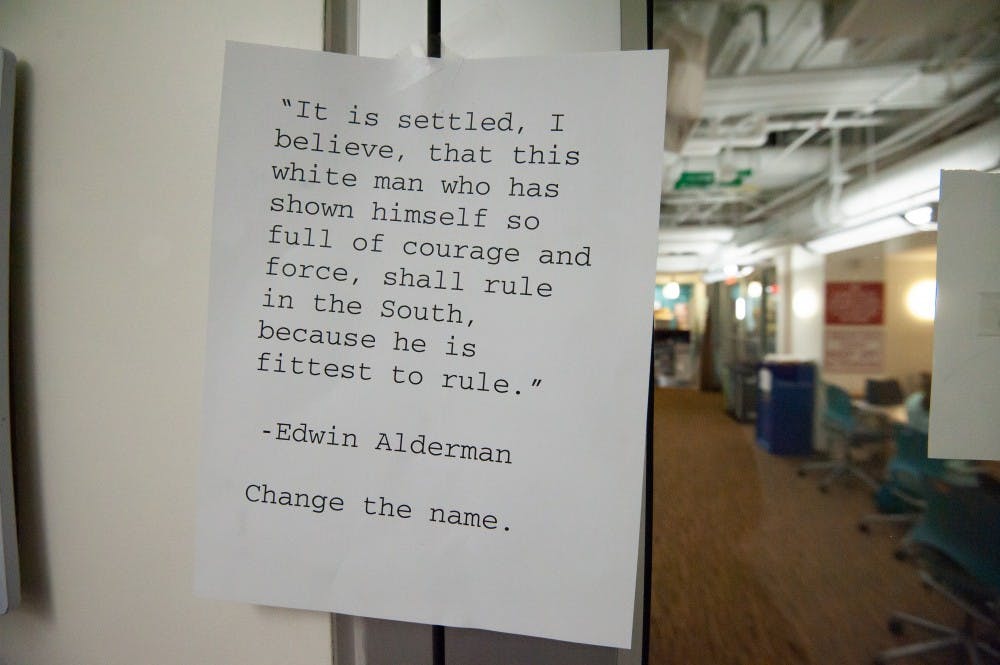Numerous fliers were posted across Grounds displaying racist quotes attributed to Edwin Alderman, a prominent figure in University history for whom Alderman Library was named.
“It is settled, I believe, that this white man who has shown himself so full of courage and force, shall rule in the South because he is fittest to rule,” one quote from Alderman’s Annual Report of the Commissioner of Education, Volume 1, reads. At the time it was written, Alderman was the president of the University of North Carolina, Chapel Hill.
University President Jim Ryan has broadly addressed the idea of renaming Alderman and other buildings with similarly notorious namesakes.
“We’re in the process of thinking about a number of names,” Ryan said in an interview with The Cavalier Daily Sept. 9.
In an email statement to The Cavalier Daily, University Spokesperson Wes Hester addressed Alderman’s past and confirmed that the discussion around the naming process for the building is “ongoing.”
“The naming of facilities on the Grounds is an important and ongoing dialogue, and Alderman Library is a part of that conversation, though no decisions have been made at this time,” Hester said.
Hester acknowledged the conflict between Alderman’s accomplishments and his troubled history.
“Alderman served as the first president of the University of Virginia from 1905 to 1931 and contributed to its growth into one of the best public institutions of higher education in the country,” Hester said. “Alderman also held beliefs that are contrary to our values, specifically in his support of eugenics, and he participated in events that supported racism. His tenure illustrates the University’s complicated past, a history we continue to research and contextualize today.”
Edwin Alderman was the University’s first president, serving from 1905 until 1931. According to his biography on the University’s official website, Alderman extended higher education for women, founded the Curry Memorial School of Education in 1905 and multiplied the University’s endowment by a factor of nearly 30. The biography has no mention of his racist history.
Alderman was a staunch believer in eugenics, a pseudoscience that advocates for improving the human population through selective reproduction. During Alderman’s tenure as president, he oversaw eugenicists teaching at the University, including Harvey Jordan, Harry Heck and Ivey Foreman Lewis.
In recent years, the actions of Alderman and other historical figures associated with the University have come under scrutiny, leading some to advocate for their names to be scrubbed from University buildings.
In 2016, Jordan Hall, named for eugenist and former School of Medicine Dean Harvey Jordan, was renamed Pinn Hall after Vivian Pinn, the only female, African-American student to graduate from the School of Medicine in 1967.
In 2017, the International Residential College’s Lewis House, which had been named for University biology professor and eugenicist Ivey Lewis was renamed as Yen House after W.W. Yen, the first international student to earn a bachelor of arts from the University and the first student from China to graduate in 1900.
Alderman’s legitimization of eugenics at the University helped to make it a cornerstone of Southern social policy, according to Class of 2000 graduate student Gregory Michael Dorr’s dissertation in American History, “Segregation’s Science: Eugenics and Society in Virginia.”
In 1924, Alderman gave a speech at the unveiling of the now infamous statue of Robert E. Lee, which is located in what was formerly known as Emancipation Park. The Lee statue’s proposed removal was an initiating event for the white supremacist Unite the Right rallies.
Alderman also accepted donations from the Ku Klux Klan while he served as University president, accepting a $1,000 dollar donation, which equates to roughly $12,000 today.
Kathryn Williams, a third-year College student and communications chair for the University Democrats, said that the organization supports the anonymous fliers’ proposal to change the library’s name.
“Edwin Alderman was a [eugenicist] and white supremacist, and there is simply no reason as to why the library should be named in his honor,” Williams said. “The University Democrats support a name change for the library and more importantly support increased awareness and candor surrounding the University’s racist history.”
Williams noted that it is the University’s responsibility to reconcile with its past, pointing to the biography of Alderman on its website failing to mention education in eugenics as part of Alderman’s impact.
Student Council’s Committee on Renaming, Recontextualization and Removal plans on releasing its own recommendations on name changes related to Alderman at the end of the fall 2019 semester. The Committee is chaired by third-year College student Hunter Wagenaar.
“I can tell you that Alderman has been a focus of the Committee, but that no formal conclusion has been reached on what action we are recommending within our report,” Wagenaar said in an email statement to The Cavalier Daily.
In March, Wagenaar wrote a column for The Cavalier Daily calling for the University to remove the Whispering Wall located outside Monroe Hall and Brown College, which is a memorial to Frank Hume — a Confederate soldier in The Civil War.







